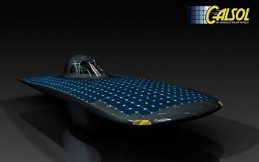UCB students’ solar vehicle to compete in world’s premier solar car race
May 9, 2011

A rendering of Impulse, CalSol’s car that will compete this October in the World Solar Challenge, an 1,800-mile road race across Australia (credit: CalSol)
Impulse, a sleek solar-powered vehicle, has been unveiled by the student-run CalSol solar vehicle team at the University of California, Berkeley and is on track to compete in the world’s premier solar car race this October.
Equipped with sophisticated electronics and six square meters of solar cells, Impulse resembles a three-wheeled spaceship. Its 16-foot-long shell is made of carbon fiber, honeycomb material, and other strong but lightweight composites. To conserve energy, Impulse is expected to weigh just 500 pounds.
It runs on electricity produced from solar cells. The electricity feeds battery packs and a 9-horsepower motor. Impulse will carry a single passenger at speeds expected to hit 70 miles per hour.
This fall, 15 to 20 students will withdraw from school for the semester to participate in CalSol’s first-ever entry in the World Solar Challenge, an 1,800-mile road race across Australia.
The team must balance velocity with efficiency since high speeds increase drag and drain energy. The goal is to start the week-long race with charged battery cells and finish drained of energy reserves. CalSol will compete against an estimated 35 international teams, including squads from the University of Michigan and Stanford, along a course that crosses the Australian outback from Darwin in the north to Adelaide in the south.
The students used computational fluid dynamics to analyze an estimated 60 body iterations before settling on Impulse’s distinctive curves and contours. They wrote a program to determine which body shape would optimize the energy captured by the car’s solar cell array, factoring in such considerations as the route, Southern Hemisphere location and time of year.
They also designed interchangeable circuit boards that will run everything from the car’s on-off switch to its horn and data logger. The boards are modular and can be easily replaced in case of malfunctions. Each one of the boards can be considered a very small computer, they explained.
The team members said they don’t see commercialization anytime soon. Among the hurdles: the cost and relative inefficiency of solar cells.